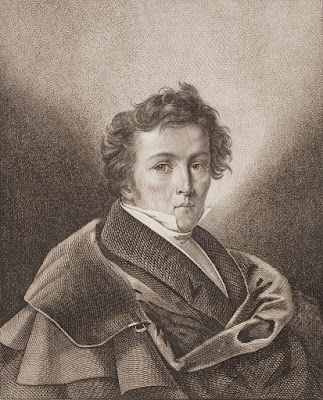 |
| Wilhelm Müller, the poet whose work formed the inspiration for Schubert's song cycle |
Schubert Die schöne Müllerin; James Newby, Simon Lepper; Wigmore Hall
Reviewed by Robert Hugill on 25 February 2022 Star rating: (★★★★★)
James Newby and Simon Lepper vividly incarnate the young miller, making his journey a roller-coaster ride of changing emotions
Schubert's Die schöne Müllerin has its origins in poet Wilhelm Müller's participation in a liederspiel, and his contribution developed into a cycle of 25 poems, published in 1821, of which twenty were set by Schubert. In fact, Müller's work clearly had great significant for Schubert, because Winterreise was also based on one of the poet's cycles.
And he certainly was intense and anxious.
Newby's protagonist was wound up from the very outset and few of the songs were completely without some sort of nervous anxiety or temperament. This was a young man to whom you wanted to say 'lighten up', she'll never be yours if you obsess so intently. Newby and Lepper plunged straight in at the beginning, so that the opening song was vigorous, restless and rather intense, certainly not carefree. You felt that for Newby, this young man had history.Not that this was a dramatised presentation. We were at a concert, but Newby incarnated the young man, he lived the experience as it unfolded, his performance vividly visual as well as with a wonderful attention to the words. Not only was his diction extremely good, but he took great expressive care over each word, sometimes at what might have seemed the expense of the musical line but in fact the gesture would pay immense expressive dividends. Newby and Lepper populated the young miller's world with vivid colours and textures, and Newby's highly active performance was matched by Lepper's superbly responsive and active piano playing.
At first emotions were held in check, in 'Wohin?' but the anticipation in 'Halt!' grew so intense that you knew it would end badly. 'Danksagung an den Bach' was quietly intimate, and in the following sequence of songs the vividly dramatic, with words tumbling out, alternated with the quietly lyrical yet even in the intimate moments that sense of drama was still there, not so much controlled as constrained, until 'Mein!', here very much the centre of the arc of the drama, overflowed with emotions difficult to contain, and the ostensible calm of 'Pause' had emotion bubbling under. The perkiness of the opening of 'Mit dem grünen Lautenbande' grew gradually more intense until 'Der Jäger' ended in near violence. From here one we were on a downward spiral, vivid drama and tightly wound intensity leading to a sense of the young miller being overwhelmed at the end of 'Die böse Farbe'. 'Trockne Blumen' was bleak, lyrically intense with vivid emotions. The final two songs were profoundly beautifully sung, yet deeply felt and the ending of 'Der Müller und der Bach' was mesmerising.
Throughout the cycle, Newby responded to the young man's journey with a constantly changing emotion, always expressed through text and music, and Lepper's pianism formed an apt partnership with the strongly coloured piano responding to the singer's vividly changing emotions. A roller-coaster of a ride, and a superbly engrossing performance.
Never miss out on future posts by following us
The blog is free, but I'd be delighted if you were to show your appreciation by buying me a coffee.
Elsewhere on this blog
- English Touring Opera's revival of Puccini's La Boheme proves finely satisfying - opera review
- The Last Castrato: Max Hoehn and Torsten Rasch on their new collaboration as part of Opera21's platform for new opera - interview
- Manhattan to Montmartre: Bernstein and Gershwin transcriptions from Julian Jacobson and Mariko Brown - record review
- The cycle of life: Jamie Manton's new production of Janacek's The Cunning Little Vixen at English National Opera - opera review
- Phantasm completes its survey of all John Jenkins's viol consorts with a disc of his four-part consorts on Linn - record review
- Early Moderns: the (very) first Viennese School from American Baroque ensemble Quicksilver - record review
- Most pieces use the dichotomy between tonality and atonality: I chat to composer Eleanor Alberga about writing music - interview
- Certainly not traditional, but true to the work's spirit and dramaturgy: Edward Dick's production of Bizet's Carmen returns to Opera North with Chrystal E Williams back in the title role - opera review
- Mendelssohn and Schumann from Antonello Manacorda and the Orchestra of the Age of Enlightenment - concert review
- Snapshots of a Romance: Elizabeth Llewellyn and Simon Lepper at Classical Vauxhall - concert review
- Vividly theatrical: Irish National Opera's production of Vivaldi's Bajazet at Covent Garden - opera review
- Devastates & dazzles: Jakub Józef Orlinski, Il Pomo d'Oro & Francesco Corti in rare 18th century arias at Wigmore Hall - concert review
- Home







%20as%20Leporello%20and%20Erik%20Tofte%20(back%20to%20camera%20in%20garnet%20shirt)%20as%20Giovanni%20-%20Don%20Giovanni.jpg)



No comments:
Post a Comment